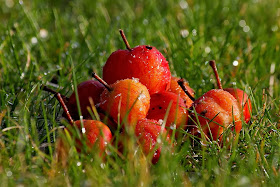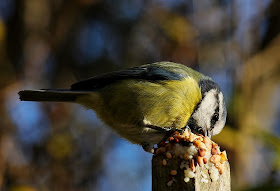“One word can end a fight; one hug can start a friendship; one smile can bring unity; one person can change your entire life!” -
Israelmore Ayivor
Developed and managed by Marsh Street Arches and Garden Community Interest Company.
Pages
▼
Saturday, 30 November 2013
How to plant and grow bulbs, corms and tubers
"Planting
bulbs, corms and tubers is an easy way to ensure colourful displays in your
garden, particularly in spring before the rest of the garden has woken from its
winter dormancy. Bulbs can be planted in containers or borders, and look
particularly effective when naturalised in grass. Thompson and Morgan have detailed information about bulbs, corms and
tubers to suit all sites and soils"
When to
plants bulbs and tubers
What soil do
bulbs prefer?
Which way up
should bulbs be planted?
Growing
bulbs in containers
How to plant
bulbs in grass
Planting
depths for bulbs and tubers
Thursday, 28 November 2013
Among todays tasks included........
Clearing leaves from the guttering on the compost toilet.
Preparing to clean some of our bird feeders
Preparing to clean some of our bird feeders
Wednesday, 27 November 2013
20 things to do with sticks - probably the world's oldest toys!
"Why do you love trees? We love them for lots of reasons, one
of them being that they give us sticks!
The ultimate 'toy' to spark a child's imagination, sticks
have a special magic power - they can become anything. A marshmallow fork, a
pair of antlers, a magic wand, part of a den, a musical instrument, a vital
piece of a space rocket......."
Potential £1 million grant fund for park ideas
"Nesta, The Heritage Lottery Fund and the Big Lottery Fund
have opened a £million grant fund to back the best parks innovations, called
Rethinking Parks. Against a background of public sector budget cuts for
discretionary services such as parks, Rethinking Parks aim is to find new
business models that will enable parks to thrive for the next century.
Voluntary and community sector organisations and public sector organisations with innovative ideas for how to make our public parks financially sustainable may apply for grants of between £50,001 and £100,000 as well as non-financial support to carry out their innovative ideas to make the UK's public parks financially sustainable"
Tuesday, 26 November 2013
FREE Vegetable Seed Sowing Guide
Thompson and Morgan seed growing guide - what to sow, when to sow it and
where to sow it.
Quote for the week.....
“Teaching a child not to step on a caterpillar is as valuable
to the child as it is to the caterpillar” – Bradley Millar
FREE A to Z of Autumn Hedgehog Tips
The People’s Trust for Endangered Species (PTES) and BritishHedgehog Preservation Society (BHPS) have together produced a free seasonal
guide on how to make your autumn garden hedgehog-friendly.
You can view and/or download the guide on the Hedgehog Street website here
Monday, 25 November 2013
Sunday, 24 November 2013
Armchair gardening
Winter - a good time for a little armchair gardening, planning for next year.
Carefully plan your vegetable garden for next year so that you
ensure good crop rotation to avoid a build up of pests and diseases.
Consider sourcing seeds for next year - reflect on what
worked well this year and what didn't.
Take an inventory of tools and equipment that you may need
for next year.
Growing fruit trees in planters and containers
There are a wide range of fruit trees that can be grown in planters, containers and pots. Among the varieties include; apple, apricot, cherries, peaches, pears and plums.
If you would like more information, please visit the Royal Horticultural Society (RHS) website here.
Various jobs around the garden in winter. Advice from Thompson and Morgan
"Wash down all of your garden tools and give them a wipe of
linseed oil on the wooden and metal areas to help prevent rusting.
Choose a dry day to clear out the garden shed in preparation
for the spring.
Check the security of your shed. This is particularly important
in winter when you visit it less often.
Repair fences and apply a wood preservative to prevent them
from rotting.
Get rid of slimy patches on the patio and paving by
scrubbing with a broom or blasting with a pressure washer. For an easy
alternative try a liquid patio cleaner.
Group potted plants together in a sheltered spot in the
garden to give them some protection from the winter weather.
Check tree ties and stakes to ensure that trees are still
secure following strong autumn winds. Tighten or loosen ties if necessary.
Wash and disinfect bird feeders and bird tables. Clean out
bird baths too.
Hang fat balls and keep bird feeders topped up to attract
birds, who will in turn eat pests in your garden.
Build or buy a compost bin.
Continue to collect fallen leaves and add to leaf bins or
compost bins to rot down.
After pruning your fruit trees use the twigs for pea sticks
or shred them and add them to your compost bin.
Turn your compost heaps to mix the ingredients and help the
contents to decompose.
Cover compost bins
with a piece of old carpet or some plastic sheeting to prevent the compost
becoming too cold and wet to rot down.
Plant bareroot native hedges to encourage wildlife and
create attractive boundaries around your garden.
Make a pile of old logs in an undisturbed corner of the
garden to provide shelter for toads and other wildlife.
Collect brightly coloured stems and berries for your
Christmas decorations""
Helping our garden buddies
When the temperature drops to freezing, place a bowl of
water out every day for the birds and other wildlife.
Make sure that ponds and
birdbaths are not frozen over.
Check apples you may have stored. Put those that are past
their best out for the birds.
Attract birds into your garden and areas where pests are
known to be a problem. Put out food for birds - seeds, nut and fat balls will
provide the ideal diet; they will reward you by eating pests such as aphids,
caterpillars, slugs and snails.
Don’t be too tidy, leave perennial plants until the spring
to cut down as they provide habitat for over wintering creatures, and seed heads for the birds to feed on.
Clear out bird boxes ready for spring.
Maintain planters and improving soil
December is a great time for weeding and improving soil.
Weeding done now will save time in the spring as perennial weed roots thicken and can spread over the winter months, making them more of a problem if left until next spring.
Digging over soil will help to allow worms and frosts to break up any clumps of heavy soil. Winter rain can also wash many nutrients. To help reduce this you can keep unused soil covered with leaf mould or fresh autumn leaves.
Weeding done now will save time in the spring as perennial weed roots thicken and can spread over the winter months, making them more of a problem if left until next spring.
Digging over soil will help to allow worms and frosts to break up any clumps of heavy soil. Winter rain can also wash many nutrients. To help reduce this you can keep unused soil covered with leaf mould or fresh autumn leaves.
Tips and advice for gardening in December/January
Useful guides for gardening in December/January.
Thompson and Morgan: http://www.thompson-morgan.com/what-to-do-in-the-garden-in-december
RHS: http://www.rhs.org.uk/Gardening/Grow-Your-Own/jobs-to-do/December
Gardeners World: http://www.gardenersworld.com/what-to-do-now/week48/
Vertical veg: http://www.verticalveg.org.uk/
Thompson and Morgan: http://www.thompson-morgan.com/what-to-do-in-the-garden-in-december
RHS: http://www.rhs.org.uk/Gardening/Grow-Your-Own/jobs-to-do/December
Gardeners World: http://www.gardenersworld.com/what-to-do-now/week48/
Vertical veg: http://www.verticalveg.org.uk/
Saturday, 23 November 2013
Wednesday, 20 November 2013
Monday, 18 November 2013
Quote for the week....
“The most beautiful people we have known are those who have
known defeat, known suffering, known struggle, known loss, and have found their
way out of the depths. These persons have an appreciation, a sensitivity, and
an understanding of life that fills them with compassion, gentleness, and a
deep loving concern. Beautiful people do not just happen.” - Elisabeth
Kübler-Ross
Friday, 15 November 2013
Thursday, 14 November 2013
FREE trees from Woodlands Trust
To celebrate National Tree week (23 November - 1 December) Woodlands Trust have over 3000 FREE tree packs to give away
to schools, community and youth groups next Spring. Apply before 10 January
2014 for the chance to receive a free tree pack to plant next year.
For more information on how you can apply, please visit their website here.
Grow Wild funding to help you create a community space
With Grow Wild you could get between £500 and £5,000 to
create a community site in your local area. They are looking for local groups
and organisations across the UK to come forward with exciting and inspirational
ideas to give neglected and uncared-for sites and spaces a new lease of life.
We’re particularly interested in hearing great ideas from groups of young
people.
A Grow Wild community site is a place where local people use
UK native plants to create a space for everyone to enjoy. They are awarding
£500 to £5,000 for each Grow Wild community site. At the moment, your Grow Wild
site might be an unloved, neglected and run down area that you’d like to reclaim
for the local community. You just need to tell us how you want to turn it into
an inspiring space for everyone. With their funding, people from all over the UK
will be able to create stunning sites that everyone will love and use.



















.JPG)
.JPG)



















.jpg)









